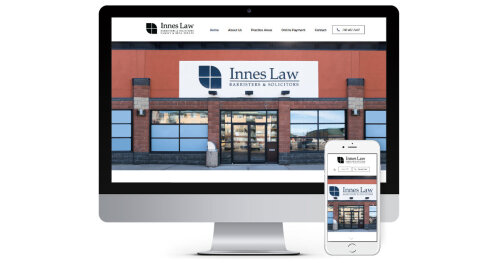Best Collaborative Law Lawyers in Grande Prairie
Share your needs with us, get contacted by law firms.
Free. Takes 2 min.
Free Guide to Hiring a Family Lawyer
List of the best lawyers in Grande Prairie, Canada
About Collaborative Law in Grande Prairie, Canada
Collaborative Law is a legal process that enables couples seeking a less adversarial method of resolving their disputes, particularly relating to family law matters such as separation, divorce, and custody arrangements. In Grande Prairie, Canada, Collaborative Law is recognized as an alternative to traditional litigation, focusing on cooperative negotiation rather than acrimonious court battles. It involves both parties working alongside their respective lawyers in a structured, respectful, and problem-solving approach to reach a satisfactory settlement without the need for a court trial.
Why You May Need a Lawyer
Individuals in Grande Prairie may require help from a Collaborative Law lawyer in various situations, including:
- Divorce or separation proceedings where both parties wish to avoid the adversarial court system.
- Child custody and support negotiations that benefit from a cooperative and child-focused resolution.
- Addressing property division in a manner that emphasizes fairness and mutual agreement.
- Situations requiring confidentiality and more control over the outcomes than what a court process might offer.
Local Laws Overview
Grande Prairie, like the rest of Alberta, adheres to provincial laws governing family and collaborative law practices. The Alberta Family Law Act, along with the Divorce Act, provides the legal framework for handling family disputes. The Collaborative Law process is supported by the Alberta Rules of Court, which allow for mediation and negotiation as viable alternatives to traditional litigation. Importantly, local regulations support collaborative agreements as legally binding, provided they are crafted in compliance with applicable laws and guidelines.
Frequently Asked Questions
What is Collaborative Law?
Collaborative Law is a voluntary process where disputing parties negotiate an agreement with the help of their lawyers, avoiding court intervention and fostering a cooperative environment.
How does Collaborative Law differ from traditional litigation?
Unlike traditional litigation, Collaborative Law encourages cooperation and communication between parties, minimizing conflict and focusing on mutually agreeable solutions that best meet the needs of both parties.
Is Collaborative Law only for divorces?
No, while commonly used in divorce cases, Collaborative Law can also be applied to other legal matters like business disputes, probate conflicts, and employment disagreements.
What happens if an agreement cannot be reached?
If parties cannot reach an agreement using Collaborative Law, they are free to pursue other legal options, but they must hire different lawyers to represent them in formal litigation to ensure neutrality.
How do I start the Collaborative Law process?
The process begins when both parties agree to pursue it and retain collaborative professionals. Initial meetings will establish goals and sign a participation agreement committing to the process and transparent communication.
How long does the Collaborative Law process take?
The duration varies based on the complexity of the issues and the willingness of the parties to cooperate, but it typically concludes faster than courtroom litigation due to the focused nature of negotiations.
Is Collaborative Law confidential?
Yes, confidentiality is a fundamental aspect of Collaborative Law. Discussions and materials used during the process cannot be used in court or disclosed to outside parties.
Are the outcomes legally binding?
Yes, once an agreement is reached and documented, it is legally binding, just like any court order, provided it complies with legal standards and is agreed upon by all involved parties.
Can we change our Collaborative Law agreement?
Amendments may be made if both parties agree to modify terms. Such changes must be documented and signed as an adjustment to the original agreement.
How do I choose the right Collaborative Lawyer?
Look for a lawyer trained in collaborative negotiation with experience in family law disputes and a practice style that aligns with your communication preferences and goals.
Additional Resources
Consider exploring resources such as:
- The Alberta Family Justice Services, which offers sessions on alternative dispute resolution.
- Grande Prairie local legal aid services that provide support and information on family law services.
- Organizations like the Alberta Chapter of the Association of Family and Conciliation Courts, which support collaborative approaches in family law.
Next Steps
If you need legal assistance in Collaborative Law, consider taking the following steps:
- Research and select a trained Collaborative Lawyer with experience in your type of dispute.
- Schedule consultations to discuss your case and objectives, ensuring alignment in approach and expectations.
- Attend an informational meeting to understand your rights and the collaborative process fully.
- Commit to the process by signing a participation agreement and begin scheduling collaborative sessions aimed at resolving your dispute.
Lawzana helps you find the best lawyers and law firms in Grande Prairie through a curated and pre-screened list of qualified legal professionals. Our platform offers rankings and detailed profiles of attorneys and law firms, allowing you to compare based on practice areas, including Collaborative Law, experience, and client feedback.
Each profile includes a description of the firm's areas of practice, client reviews, team members and partners, year of establishment, spoken languages, office locations, contact information, social media presence, and any published articles or resources. Most firms on our platform speak English and are experienced in both local and international legal matters.
Get a quote from top-rated law firms in Grande Prairie, Canada — quickly, securely, and without unnecessary hassle.
Disclaimer:
The information provided on this page is for general informational purposes only and does not constitute legal advice. While we strive to ensure the accuracy and relevance of the content, legal information may change over time, and interpretations of the law can vary. You should always consult with a qualified legal professional for advice specific to your situation.
We disclaim all liability for actions taken or not taken based on the content of this page. If you believe any information is incorrect or outdated, please contact us, and we will review and update it where appropriate.











